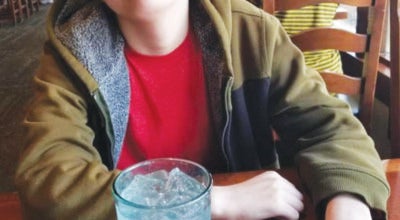The Literary Corner: Renegade Writer’s Guild
Published 9:51 am Thursday, October 17, 2019
|
Getting your Trinity Audio player ready...
|
“Judge Not”
By Julie Terry Cartner
With a sigh, Beryl slid down the wall until she hit the sidewalk. Half in the shade, half in the sun, she tilted her weather-beaten hat down over her eyes in a fruitless attempt to shut out everything: the people passing by, the glaring sun, the sounds of cars rumbling down the road, the acrid smell of exhaust, and most importantly, her own thoughts. Attempting to shrug off the sneers and jeers of people who just didn’t understand, Beryl closed her eyes. She willed her mind to go blank, and it might have worked, had the child not spoken.
A little girl, probably four or five, with daisies printed across a lime green dress giggled, “Momma, are we gonna get ice cream now? I love chocolate. Chocolate is the best. May I have two scoops?” The laughter-filled voice resonated through Beryl’s mind, whirling her back to a time she tried so desperately to forget, but, unyielding to her anguish, the memories came flooding back.
Her beautiful little girl, dressed in a yellow sundress patterned with bright white daisies skipped down the sidewalk, chestnut curls bouncing with every step. “Momma, please, can we get ice cream? Please, please, please?”
“May we, not can we,” was Beryl’s automatic response, yet her mind was elsewhere. How was she going to get everything done that she needed to do before her husband came home from his business trip? She needed at least three more hours in the office; Gemma was supposed to be in her afternoon pre-school in thirty minutes; the house was a wreck, and there was nothing in the refrigerator for dinner. Things had been going just fine until she got a flat tire, so here they were walking down the sidewalk instead of speeding down the road heading towards Noah’s Ark, the pre-school.
But right in front of them, across the street was Gemma’s favorite place, The Big Dipper. Might as well, Beryl thought, the day’s shot anyway, at least I can put a smile on Gemma’s face. “Okay,” she replied, “we’ll get ice cream.”
With a scream of excitement, and before Beryl could even react, Gemma darted across the busy street. A scream and a thud, and Beryl’s world, as she knew it, came to an abrupt end. Now the kaleidoscope of memories: running into the street, screaming for help, 911, sirens, the gurney, and Gemma’s unconscious body being lifted into the ambulance, more sirens, then the hospital. The frantic phone call and the beep, beep, beeping of machines trying to keep her most precious child alive.
Then even faster, swirling through her brain like a tornado: her husband’s arrival, shouting, blaming, cursing, then surgery after surgery, Gemma alive, but in a coma. Days. Weeks. Months. And then her little body gave out. The last memories: the tiny coffin, the grave, the wilted yellow and white daisies.
Bills and more bills. Doctors, surgeries, X-Rays, MRI’s, then the extended care facility. Medicines, IV’s, feeding tube, so much to keep Gemma alive, and, when that failed, the funeral expenses because even modern medicine couldn’t defeat death. Her job, lost when she couldn’t perform, her husband gone, his last words echoing hollowly through her brain, “Your fault, you pay, your fault, your debts, your fault, your fault…” as the door shut behind him.
The car, the house, all the furnishings, her jewelry, her beloved antiques, all gone, all swallowed up by bills like a starving swarm of locusts eating everything in sight. And now, here she was, destitute, homeless, jobless, alone. How had her perfect life devolved to this?
For just an instant she remembered her former life: a great job, wonderful marriage, beautiful child, fulfilled. She remembered and then watched it blow away, flitting through the air and gone, like smoke. And now, here she sat, shunned by an uncaring society, receiving only looks of disdain, when all she wanted was the sweet oblivion of forgetfulness.
How long she sat there, she didn’t know and only roused to life when that sweet little girl with daisies on her dress, knelt beside her and offered her an ice cream cone. “Chocolate, my favorite.”
“Raise Up a Child”
By Gaye Hoots
I have been a member of the senior citizen community for several years, and a concern of mine is whether the younger generations have the strength to handle hard times. We were raised doing physical labor, and have lived through wars, natural disasters, and terrorist attacks. We have also tried to shield our children, grandchildren, and great-grandchildren from the tough times in life. The news is full of, “What is the world coming to?” stories.
This week I witnessed young people that gave me hope. My great-granddaughter was inducted into the BETA Club at Ellis Middle School. She and about thirty of her peers were neatly dressed, behaved respectfully, and had worked hard to accomplish this. Many of the kids take the initiative to do their homework on their own before their parents are home from work.
While reading the Enterprise this week, I saw another example of self-discipline. An interview with an athlete asked what he would do if he won the lottery. His first response was to tithe. This is reassuring.
Last week Davie County lost a beloved bus driver. She lost consciousness while driving a school bus. The kids recognized the emergency, stopped the bus, called EMS, and administered to her until help arrived.
Yesterday I was at Chick-fil-a with my twin granddaughters who are not yet three years old. They had been playing in the play area when two boys a bit larger than them entered. The twins were coming down the slide, and the boys climbed the ladder to the top of the slide. The twins scrambled up the ladder behind them. The boys stopped, one on each side of the platform, and let the girls go ahead of them.
Several weeks ago, a neighborhood boy borrowed my shovel and broke it. It was old, so I never gave it another thought. Later I found he had replaced it with another shovel.
Thinking back, I worked with special education youth and the adolescent psychiatric population for many years. I was often careless with my handbag when taking kids on outings outside the facility. Many times, I had one of the kids bring my bag to me and warn me to keep it with me. I never had anything taken from my personal belongings. The kids on the psych unit often acted out and would strike out. The only time I was ever injured was when I had to restrain someone to prevent him from harming himself or others. I stepped between two boys who were fighting and had them warn me of how dangerous that was for me, but they always stopped without injuring me. Many of the clients at the mental health outpatient clinic came with kids in tow. You could tell life was not easy for these children, but they would hold doors open for me. I don’t know where they learned this for often their mothers had experienced abuse at home.
Perhaps our youth are much stronger than I realized.
“Tommy’s Adventure”
By Marie Craig
Thomas Jasper Richardson was 15 years old on February 22, 1861. His nickname was Tommy. He was a big help on the farm in Davie County. His father, Addison M., and his older brother, George W., and he worked hard on their big farm. There were six younger children in the family by the end of that year, and they needed all the food they could raise. Some of the neighbors had slaves to help do all the work, but Tommy’s family did not. He had heard rumors that the whole United States might be involved in a war against each other, but he couldn’t believe that it would happen.
Farm work was going well until the Civil War broke out. Tommy’s dad and his older brother were soon gone to fight in this conflict. Tommy was concerned that he was now the man of the house and would have to run the farm and do the work of three men. His mother helped when she could, but there were little children to watch and feed. It was a hard time for him.
Luckily, his father and his brother returned after the war, and Tommy was relieved of his duty of being in charge. George married Samantha, and they had a son, Jasper L. Things were tough around the South after the Civil War. One day in the post office, Tommy and George saw a poster about land being developed and good opportunities in Poweshiek County, Iowa. New towns were being formed along the new railroad lines. They discussed the possibility of going there to improve their lives but knew their parents and siblings would be sad to see them move about 950 miles away.
But they decided that the four of them, George, Samantha, Jasper, and Tommy, would ride the train to see if they could get a new start in life. It was a sad day for all of them. The 1870 census for Iowa shows them living on a farm in Jackson, Poweshiek County, Iowa. Jasper is two years old, born in North Carolina.
Evidently, this did not work out because land records show Tommy buying land on March 2, 1872, in Davie County from Elisha Wilson. The next day, Tommy, 26, married Dorcas Emeline Dyson, who was 18. They worked hard on their farm and raised seven children — one was my grandfather, David Lafayette Richardson. Tommy lived to be 85, and Dorcas died when she was 80. I surely am glad they came back to North Carolina. Iowa is much too cold.
George, Samantha, and Jasper returned to Davie County also, along with their daughter who was born in Iowa.
I never heard my mother mention this Iowa connection, but was able to trace it using online genealogical information. I wish I knew more about their short stay in Iowa and wish somebody had kept a journal. What stories in your life will be lost some day because you didn’t write them down?
RWG Literary Corner
For more information on Renegade Writers Guild, visit www.renegadewritersguild.wordpress.com.
Submit a favorite memory of life in Davie County. Story should be typed and not more than 250 words. Please include your name and phone number or email address. RWG retains reprint rights. Email to lhb1@yadtel.net.





